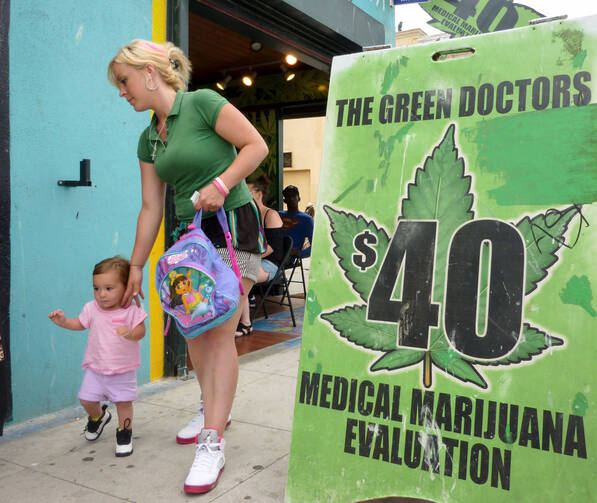Pot-Buyers’ Remorse?
Watching buyers line up outside marijuana apothecaries looking for all the world like a queue forming before the latest Apple store opening provoked a sense of amazement as legal retail recreational marijuana sales began in Colorado on Jan. 1. While arguments in favor of formalizing the U.S. pot market are many, now that the nation’s 420 moment has finally arrived, one cannot help feeling a slight twinge of buyer’s remorse. Is this really a good idea?
Other states now appear poised to end the hypocrisy around marijuana use and a costly and discriminatory prohibition that produced as many judicial victims as it purported to save. But is the nation seeding a generation of psychotropic thrill seekers, gatewaying through a pot haze into a lifetime of more serious addictions? Is it plumping up the psychological pillows for Gen-Rx non-achievers?
The whole nation will be watching Colorado and Washington as this first try at legalization—rationalizing a market that will persist with or without state approval or regulation—unfolds. Parents are already properly concerned about legalized pot’s trickle-down potential. And what will happen when Big Tobacco, eyeing the profit potential of marijuana, shifts its production and marketing might to a new opportunity? Is there a stoned version of Joe Camel already waiting in the wings on Madison Avenue? Attentive regulators and good data will be needed to assess this needed social experiment.
Family-Friendly Francis
“Let them eat; no worries.” Pope Francis spoke these words not in support of the poor in the streets, as is his custom, but on behalf of infants in the Sistine Chapel. On Jan. 12, the feast of the Baptism of the Lord, Francis described the 32 infants presented for baptism there as “the main focus” and, noting that the children might grow hungry during the lengthy ceremony, he urged the mothers to feel free to breastfeed them during the liturgy. Breastfeeding in public has long attracted controversy in the United States, so many U.S. Catholics have found Francis’ frankness on the matter to be a refreshing acknowledgment of the practice as a natural part of motherhood.
Many also have been encouraged by Francis’ response to one of the couples who presented their child for baptism but reportedly are not married in the church. The baptism of this child by Francis reflects a loving and pastoral decision, but not a remarkable one, canonically speaking. Francis made clear during his homily that he expected parents to pass on the faith, calling it a “duty” and “the most beautiful inheritance they will leave” their children. In his Angelus message, he also expressed hope that the parents’ encounter that day would help them to rediscover their own faith “in a new way.”
Pope Francis’ actions acknowledge the fact that family situations often viewed by the church as anomalies are in many societies the new everyday reality. Recognizing that our world is a complicated and “messy” place, to use Francis’ word, is the first step toward welcoming and comforting today’s nontraditional families in their quest to follow more faithfully the One whose own family situation was anything but ordinary.
Talking Poverty
Fifty years after President Lyndon B. Johnson declared a “war on poverty,” the worthiness of those initiatives is still being debated. This is puzzling. The poor may still be with us, but without the expansion of government programs for the sick and the elderly in the 1960s, they would be many more in number.
That the nation started talking about poverty was largely due to a Catholic president and a former member of the Catholic Worker movement. In 1962 Michael Harrington, an admirer of Dorothy Day, wrote The Other America, a short, eloquent indictment of a country that let so many of its citizens go hungry. President John F. Kennedy was aware of the book and took up the cause, which was continued by President Johnson. The government arm of the war on poverty was led by Sargent Shriver, a member of the Kennedy family. Joseph A. Califano Jr., like Harrington a graduate of the College of the Holy Cross, helped guide the implementation of the Great Society as a policy adviser to President Johnson.
Today a conversation on poverty has started again, inspired in part by the words of Pope Francis. Once again Catholic politicians are in the middle of the discussion. They do not agree on a common approach, but perhaps common ground can be found on two fronts. First, government is not the only answer. Private anti-poverty initiatives can also be very effective. When it comes to fighting poverty, the central question should not be “Who pays for it?” but “Does it work?” Second, when executed thoughtfully, government programs can work. President Johnson’s domestic policy agenda resulted in a substantial drop in the number of Americans living below the poverty line.








